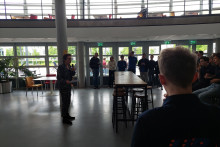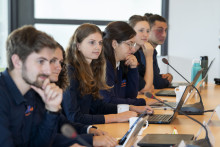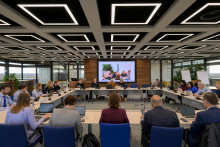For the student parties, it was once again the classic duel between UReka and DAS. In recent years, the elections have invariably led to the same distribution of seats: six for UReka, three for DAS. This year was no exception to that rule.
Residual seat
However, the race was tight. As in previous years, the hard-fought ‘rest seat’ was in favour of UReka. DAS received a total of 3.4 seats, UReka 5.6. Rounded-off is a sixth seat for the longest-serving and again largest student party. The turnout was slightly higher than last year, with 25,82 percent (last year it was 25,35 percent).
'I could cry', responds Robin Kamphuis of DAS. 'We worked our butts off, saw the inside of every pub in the city centre, spoke to students in the library... I don't know what else we need to do. We were very confident that the remaining seat would now fall our way, also because it was so close last year. Either we have to run a more aggressive campaign next year, or maybe we shouldn’t try as hard.'
UReka's Oliver Davies is pleased with the result. 'It was very close, as in recent years. But we are very happy with another six seats.' Davies will remain on the University Council for another year. 'With all the developments at the moment, I think it's good to have continuity.'
High turnout
There was no election battle among the employees. Only one party – Campus Coalition – stood for election, albeit with eleven candidates for nine available seats. Nevertheless, the turnout rate was relatively high; 42.10 percent of employees voted. Two years ago it was 30.01 percent, the previous elections the turnout hovered around 35 percent. 'It's not a historical record, but the turnout hasn't been this high for a long time,' says University Council celebrity Herbert Wormeester.
The high turnout among employees for the faculty council elections was also striking. Those results were also announced on Friday afternoon. At both ET and BMS, employee turnout exceeded 50 percent. 'Employee participation has people's attention, possibly due to both national and local developments,' says Wormeester, referring to the current financial situation of the UT.







